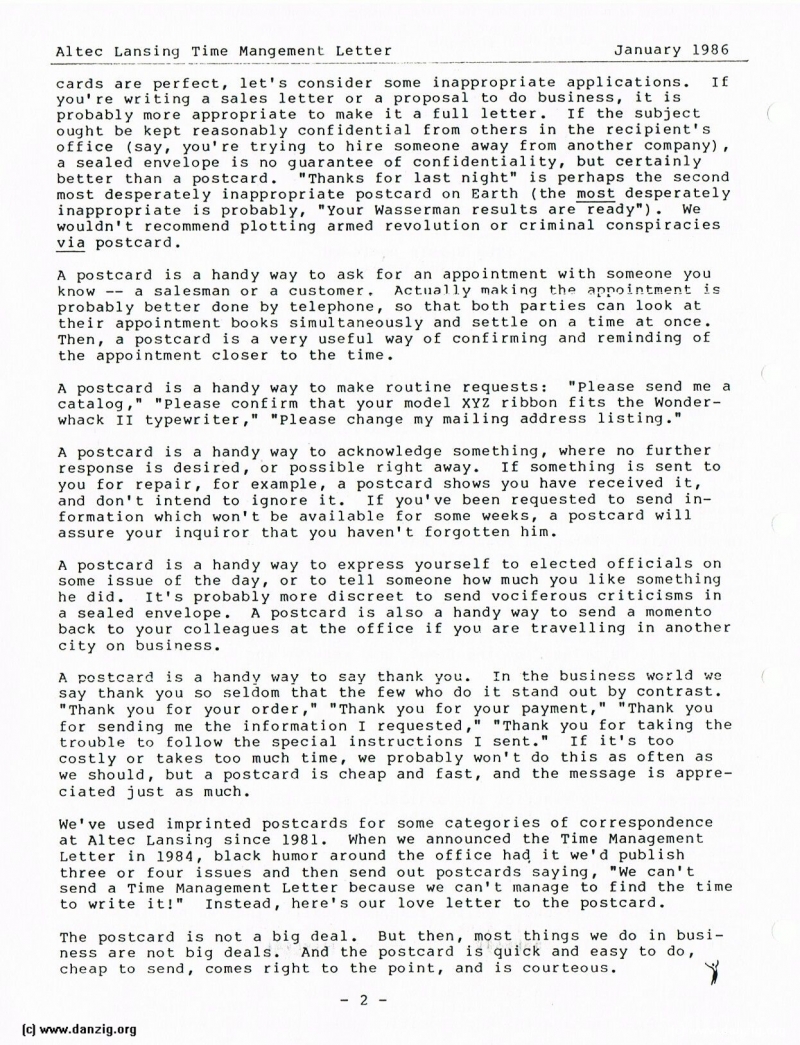
cards are perfect, let’s consider some inappropriate applications. If you’re writing a sales letter or a proposal to do business, it is probably more appropriate to make it a full letter. If the subject ought be kept reasonably confidential from others in the recipient’s office (say, you’re trying to hire someone away from another company), a sealed envelope is no guarantee of confidentiality, but certainly better than a postcard. “Thanks for last night” is perhaps the second most desperately inappropriate postcard on Earth (the most desperately inappropriate Is probably, “Your Wasserman results are ready”) . We wouldn’t recommend plotting armed revolution or criminal conspiracies via postcard.
A postcard is a handy way to ask for an appointment with someone you know —— a salesman or a customer. Actually making th’ appointment is probably better done by telephone, so that both parties can look at their appointment books simultaneously and settle on a time at once. Then, a postcard is a very useful way of confirming and reminding of the appointment closer to the time.
A postcard is a handy way to make routine requests: “Please send me a catalog,” “Please confirm that your model xYZ ribbon fits the Wonder— whack II typewriter,” “please change my mailing address listing.”
A postcard is a handy way to acknowledge something, where no further response is desired, or possible right away. If something is sent to you for repair, for example, a postcard shows you have received it, and don’t intend to ignore it. If you’ve been requested to send inf ormation which won’t be available for some weeks, a postcard will assure your inquiror that you haven’t forgotten him.
A postcard is a handy way to express yourself to elected officials on some issue of the day, or to tell someone how much you like something he did. It’s probably more discreet to send vociferous criticisms in a sealed envelope. A postcard is also a handy way to send a momento back to your colleagues at the office if you are travelling in another city on business.
A postcard is a handy way to say thank you. In the business world we say thank you so seldom that the few who do it stand out by contrast. “Thank you for your order,” “Thank you for your payment,” “Thank you for sending me the information I requested,” “Thank you for taking the trouble to follow the special instructions I sent.” If it’s too costly or takes too much time, we probably won’t do this as often as we should, but a postcard is cheap and fast, and the message is apprec iated just as much.
We’ve used imprinted postcards for some categories of correspondence at Altec Lansing since 1981. When we announced the Time Management Letter in 1984, black humor around the office had it we’d publish three or four issues and then send out postcards saying, “We can’t send a Time Management Letter because we can’t manage to find the time to write it.!” Instead, here’s our love letter to the postcard.
The postcard is not a big deal. But then, most things we do in busin ess are not big deals. And the postcard is quick and easy to do, cheap to send, comes right to the point, and is courteous.
Danzig Report Vol. 1 - Nr. 53 - October - November - December - 1986, Page 14.
Hits: 3246
Added: 21/06/2015
Copyright: 2025 Danzig.org

